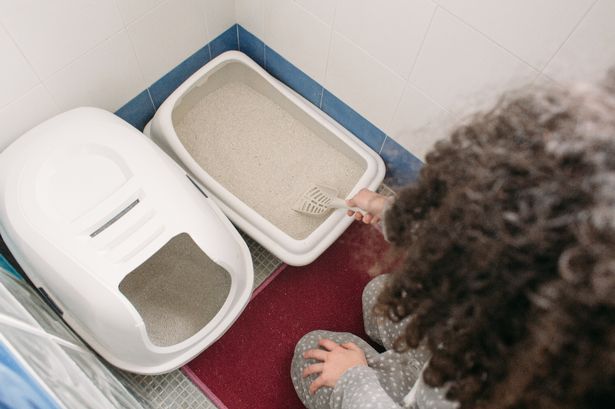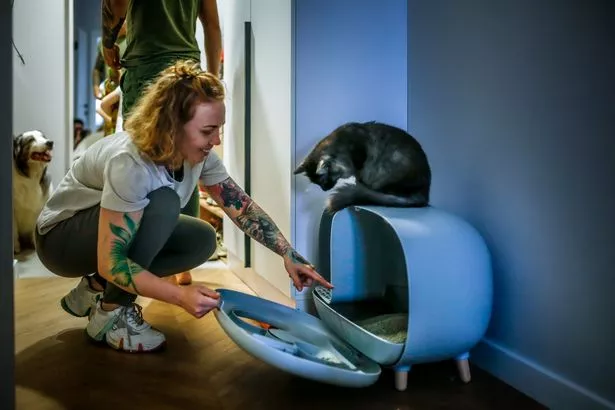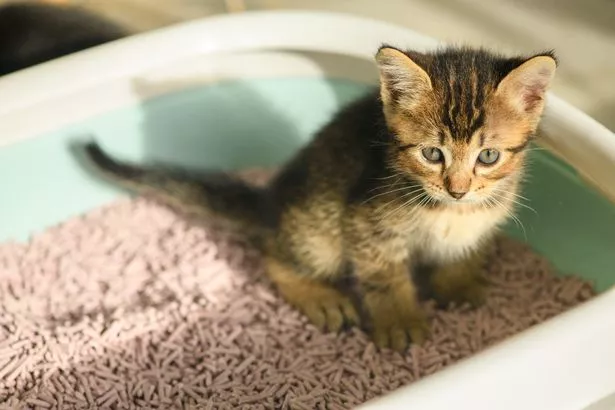
Cat owners have been warned by vets that there is a reason your furry friend is going to the toilet in your house, leaving your floor and carpets smelly. Advising people amid a Google search surge for ‘How to stop your cat peeing in the house’, it’s clear it’s a problem many cat owners face.
Dr Suzanne Moyes, in-house vet at animal experts Burgess Pet Care explains why cat owners might be facing this issue. She explained: “Cats may pee outside their litter box for a variety of reasons.
“From medical issues, litter box problems, to even stress or anxiety. Even if your cat once used to use a litter tray, if they are feeling stressed or anxious, this can trigger a change in their urinating habits.
“It’s important to rule out underlying medical conditions with a vet first, to ensure a urinary tract infection or kidney problem isn’t the reason why. If your cat is healthy, next consider how clean your litter box is, the location of it and the type of litter being used.
“Other factors that can cause cats to pee outside their litter box can include changes in their environment such as a new pet, a cat in the neighbourhood, or even rearranged furniture. Moving house or even a new person in the home can sometimes be the trigger, causing the cat to feel they need to ‘mark’ spots in their house to mark their territory.”
6 simple ways to stop your cat from peeing everywhere

(Image: Getty)
1. Take note of where they are peeing
To stop cats from peeing outside their litter box, you need to ensure they have no underlying medical issues. You should also take note of where they’re peeing. If they’re doing it in the perimeter of a carpet, especially near walls, this could be seen as a boundary to establish their area, the vet reveals.
She explained: “If a cat is feeling stressed or anxious, they could be weeing on new items in the home as a way of scent marking. Cats are sensitive to changes in their environment and use scent marking as a way to feel more secure. New items in the home may not smell like them, leading them to urinate and add their scent.”
2. Follow this guideline for multi-cat households
If you have multiple cats, ensure each of them has their own litter box to reduce territorial issues. Suzanne noted: “A good guideline to follow is ensuring you have one litter box per cat, plus one extra. This helps to avoid competition between cats. Ensuring multiple cats have their own food and water bowls is important in helping to reduce territorial problems and stress.”
3. Place obstacles in their favourite spot
“Cats have a strong sense of smell and may return to a spot they’ve previously urinated, especially if they detect their own scent,” Suzanne continued. “This signals territorial marking, particularly if they sense other cats nearby or are experiencing stress.”
To deter them from peeing in the same spot, you should try placing food bowls or toys in those areas to discourage them from urinating there again, she suggests.
4. Move litter trays around
Try out various types of litter and litter box styles to find what your cat likes best, and be sure to place the box in a quiet, private spot in your home.

(Image: Getty)
“It’s worth observing your cat’s behaviour and adjusting the placement of litter trays as needed. If your cat is peeing in a particular spot outside of the litter tray, such as the corner of the room, try moving the litter tray here”, she added.
5. Reduce stress
You need to aim to ensure your cat is relaxed as possible. Suzanne suggests: “Ensure they have hiding places and avoid sudden changes in their routine and environment if you can.
“Playing with them regularly can help to reduce stress as well as placing pheromone diffusers into rooms to help reduce anxiety. Reward your cat for using the litter box with treats and praise, when used correctly.
6. Clean cat urine effectively
In her final piece of advice for worried cat owners, she urges people to ensure “make sure you thoroughly clean any areas your cat has urinated on to remove the scent as much as possible, as they are more likely to do it in the same spot again if they can smell their scent.
“To remove the scent, start by blotting it up with paper towels before using a disinfectant spray to break down the uric acid in the urine. Follow up with a solution of vinegar and water to help neutralise the odour, to help remove the scent.”
After you’ve done this, you should sprinkle baking soda over the affected area and let it sit overnight to help absorb any remaining odours. Finish by vacuuming the affected area thoroughly, she concluded.
Is this helpful? Let us know how you get on in the comments, and bonus points if you also have some helpful tips.

